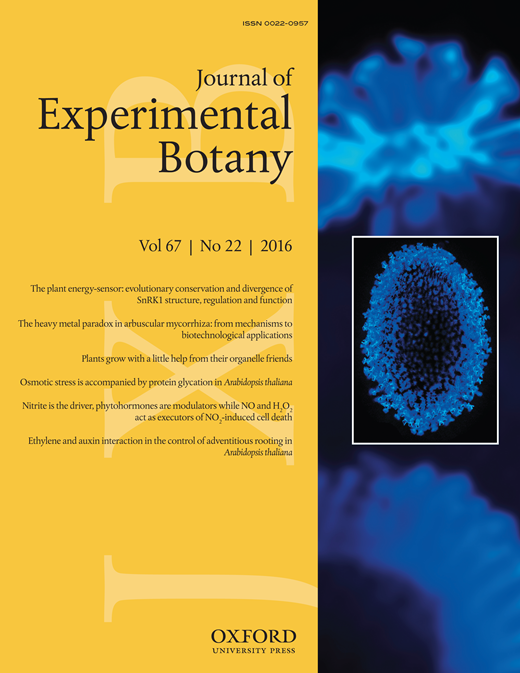Ver ítem
- xmlui.general.dspace_homeCentros e Institutos de InvestigaciónCICVyA. Centro de Investigación en Ciencias Veterinarias y AgronómicasInstituto de BiotecnologíaArtículos científicosxmlui.ArtifactBrowser.ItemViewer.trail
- Inicio
- Centros e Institutos de Investigación
- CICVyA. Centro de Investigación en Ciencias Veterinarias y Agronómicas
- Instituto de Biotecnología
- Artículos científicos
- Ver ítem
Galacturonosyltransferase 4 silencing alters pectin composition and carbon partitioning in tomato
Resumen
Pectin is a main component of the plant cell wall and is the most complex family of polysaccharides in nature. Its composition is essential for the normal growth and morphology pattern, as demonstrated by pectin-defective mutant phenotypes. Besides this basic role in plant physiology, in tomato, pectin structure contributes to very important quality traits such as fruit firmness. Sixty-seven different enzymatic activities have been suggested to be
[ver mas...]
Pectin is a main component of the plant cell wall and is the most complex family of polysaccharides in nature. Its composition is essential for the normal growth and morphology pattern, as demonstrated by pectin-defective mutant phenotypes. Besides this basic role in plant physiology, in tomato, pectin structure contributes to very important quality traits such as fruit firmness. Sixty-seven different enzymatic activities have been suggested to be required for pectin biosynthesis, but only a few genes have been identified and studied so far. This study characterized the tomato galacturonosyltransferase (GAUT) family and performed a detailed functional study of the GAUT4 gene. The tomato genome harbours all genes orthologous to those described previously in Arabidopsis thaliana, and a transcriptional profile revealed that the GAUT4 gene was expressed at higher levels in developing organs. GAUT4-silenced tomato plants exhibited an increment in vegetative biomass associated with palisade parenchyma enlargement. Silenced fruits showed an altered pectin composition and accumulated less starch along with a reduced amount of pectin, which coincided with an increase in firmness. Moreover, the harvest index was dramatically reduced as a consequence of the reduction in the fruit weight and number. Altogether, these results suggest that, beyond its role in pectin biosynthesis, GAUT4 interferes with carbon metabolism, partitioning, and allocation. Hence, this cell-wall-related gene seems to be key in determining plant growth and fruit production in tomato
[Cerrar]

Autor
Godoy, Fabiana de;
Bermúdez, Luisa;
Lira, Bruno Silvestre;
Souza, Amanda Pereira de;
Elbl, Paula;
Demarco, Diego;
Alseekh, Saleh;
Insani, Ester Marina;
Buckeridge, Marcos;
Almeida, Juliana;
Grigioni, Gabriela Maria;
Fernie, Alisdair R.;
Carrari, Fernando;
Rossi, Magdalena;
Fuente
Journal of Experimental Botany 64 (8) : 2449–2466 (May 2013)
Fecha
2013-04
ISSN
0022-0957 (Print)
1460-2431 (Online)
1460-2431 (Online)
Formato
pdf
Tipo de documento
artículo
Palabras Claves
Derechos de acceso
Abierto
 Excepto donde se diga explicitamente, este item se publica bajo la siguiente descripción: Creative Commons Attribution-NonCommercial-ShareAlike 2.5 Unported (CC BY-NC-SA 2.5)
Excepto donde se diga explicitamente, este item se publica bajo la siguiente descripción: Creative Commons Attribution-NonCommercial-ShareAlike 2.5 Unported (CC BY-NC-SA 2.5)


